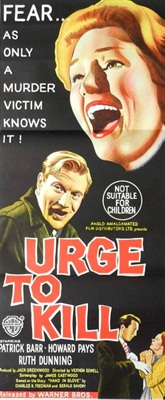Urge to Kill (film)
| Urge to Kill | |
|---|---|

Original Australian daybill poster
|
|
| Directed by | Vernon Sewell |
| Produced by | Jack Greenwood |
| Written by | James Eastwood Gerald Savory (story) |
| Starring |
Patrick Barr Ruth Dunning |
| Cinematography | John Wiles |
| Edited by | Geoffrey Muller |
| Distributed by | Anglo-Amalgamated |
|
Release date
|
March 1960 |
|
Running time
|
59 minutes |
| Country | United Kingdom |
| Language | English |
Urge to Kill is a 1960 British B-movie serial killer film, directed by Vernon Sewell and starring Patrick Barr, Ruth Dunning and Terence Knapp. The film is based on the novel Hughie Roddis and play Hand in Glove, both by Gerald Savory. It is regarded as a minor cult film thanks to its unrelenting shabby grimness and some unintentionally comic, dated and politically incorrect dialogue – one suspect is repeatedly referred to as "a mental case", while the police, trying to work out why one hapless victim was selected for her grisly fate, speculate "perhaps she was a Jezebel."
While making her way home from the cinema one night in a particularly grey and drab town, a young woman is murdered in an unusually brutal and sadistic manner. Local suspicion immediately falls on Hughie (Knapp), a strangely behaved and not very bright local youth who has a habit of wandering aimlessly around the town at all hours randomly collecting stray bits and pieces, with a particular fondness for broken glass – which unfortunately for Hughie happens to have been one of the weapons used in the fatal attack.
Hughie lives in the lodging house run by his aunt (Dunning), along with a selection of boarders including a kindly elderly gent with a penchant for Bible-bashing (Wilfrid Brambell) and a smooth-talking ladies man (Howard Pays). Hughie is questioned by the police, but Superintendent Allen (Barr) releases him as there is no firm evidence against him. A few days later another girl is killed in the town, and the locals make up their minds that Hughie is responsible and launch a witch-hunt against him. Believing the police are failing to do their job properly, they start issuing death threats against him after gathering in the pub to discuss the case, and the front window of the lodging house is put through by a large rock. Again, Allen's instincts tell him that Hughie is basically a harmless if odd soul, and is not responsible for the killings. He starts to look more closely at other individuals connected to Hughie, in the belief that somebody is going out of their way to set him up. While the townsfolk continue their vendetta, Allen quietly observes and finds his attention focussed on a likely suspect. He shadows the individual as he walks the streets of the town one night and catches the guilty party almost in the act, narrowly saving another young woman from a murderous attack.
...
Wikipedia
